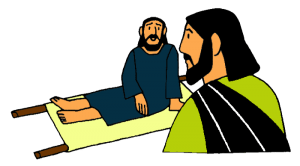John 5.9-18

We know John included the events around the healing of the paralyzed man at the pool of Bethesda as the third sign that Jesus is the Messiah, the Son of God. It is not a sign simply because of its miraculous nature but also because of what Jesus said regarding his actions in the follow up to the healing. The day of the healing was the Jewish Sabbath and Jesus’ instruction to the man was to pick up his mat and walk, which he immediately did. John 5.8 There is no record of the man objecting that he couldn’t possibly do that on a Sabbath. He was in receipt of grace and mercy. The pool though was a large crowded place and he was seen by Jewish leaders who challenged him. ‘It is the Sabbath; the law forbids you to carry your mat.’ John 5.10
At this first point the first chasm of understanding is exposed. For the Jewish leaders salvation was dependent on keeping the law meticulously. Salvation in their mind was earned and if one was ‘good’ at keeping the law one was better than those who were not so good at it. It took a great deal of effort and study to achieve so little. However, being so meticulous and interpreting the law so rigorously, fed their self-righteousness. It also, in their eyes, gave them the right to judge and condemn. Can you see how in adopting these attitudes they were attributing to themselves god like status about their own righteousness and right to both judge and condemn? In their apparent effort to be obedient they were in fact going down the line of idolatry, for only God who is truly righteous is both the one who judges and has the right to condemn.
The man replies that he has no idea who healed him. This seems to be the most extraordinary lack of curiosity and thankfulness. Jesus had just completely changed his life beyond anything he could have realistically thought and he didn’t even ask Jesus’ name. At this point the object of the Jewish leader’s wrath moves from the healed man to the healer who had instructed him to carry his mat. But this was just the start of an escalating situation. When Jesus later saw the man again he stopped and spoke to him, ‘See, you are well again. Stop sinning or something worse may happen to you.’ John5.14 For some reason the man thought it would be a good idea to promptly find the same Jewish leaders and tell them it was Jesus who healed him. The motivation for this is interesting, he was clearly aware that the Jewish leaders were hostile to Jesus for his act of mercy on a Sabbath day but was more interested in keeping in with them than protecting the very person who had healed him. This raises for ourselves the need for self-awareness of our own motivations for the things we do and say.
Our own receipt of God’s mercy can be thrown back in his face whilst at the same time as we continue to benefit from the mercy of God. If we connect that with the warning Jesus gave the healed man, to ‘stop sinning’ John 5.14 it raises the question of how many times we throw Jesus mercy towards us in his face by our own persistence in carrying on sinning. How seriously do we take our continued sin? Jesus’ warning to the man that, ‘something worse may happen to you’ was not a reference to another malady brought on by his sin either administered by God or otherwise but a warning of God’s judgement.
The response to Jesus, who is the one who is genuinely righteous and has the right to judge and condemn, was to set about persecuting him. When the word persecute is used in this context it does not mean say hateful things or make life difficult. It is absolutely clear it means plot to kill Jesus. John5.18 In addition to Jesus acting mercifully on the Sabbath was added the charge that he was making himself equal to God.
A second chasm opened at this point was over the identity of Jesus. In response to the Jewish leader’s accusations Jesus spoke directly to them. It confronted their understanding of the Sabbath, a fundamental pillar of their religiosity, and Jesus’ relationship with God the Father. Jesus’ statement that God the Father works on the Sabbath bringing grace, mercy and salvation to people conflicted with their own beliefs about the Sabbath. God, Jesus was saying, does not become detached from the world and people’s need on the Sabbath, he continues to be a merciful and loving God active in people’s lives.
Additionally, no Jew would term God their Father as Jesus did. Jesus by saying God was his Father and he was about his Father’s work was making a statement that Jesus was equal to the Father. He was indeed God incarnate. Jesus was saying he is the Lord of the Sabbath and his healing of the man was evidence that both he and God the Father were at work. He had the right to heal on the Sabbath and to tell the man to carry his mat because he was Lord of the Sabbath.
A divide had arisen, “between God’s Son and God’s historic people who want to kill him”. (John’s Gospel: Read, Mark, Learn. Marshall Pickering.)
Are we comfortable with our own sin?
Is there a danger of succumbing to the idolatry of legalism?
Have we taken in the significance of Jesus’ equality with the Father when we reflect on his words?
Lord Reign in me – Brenton Brown
